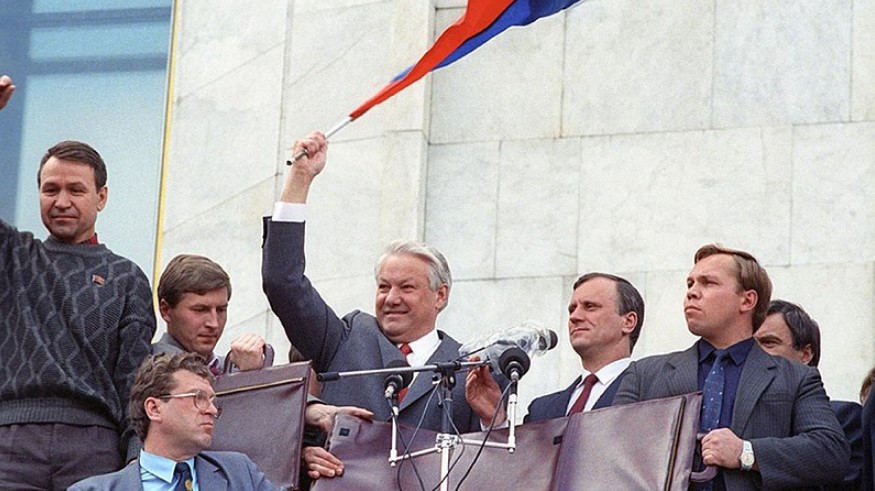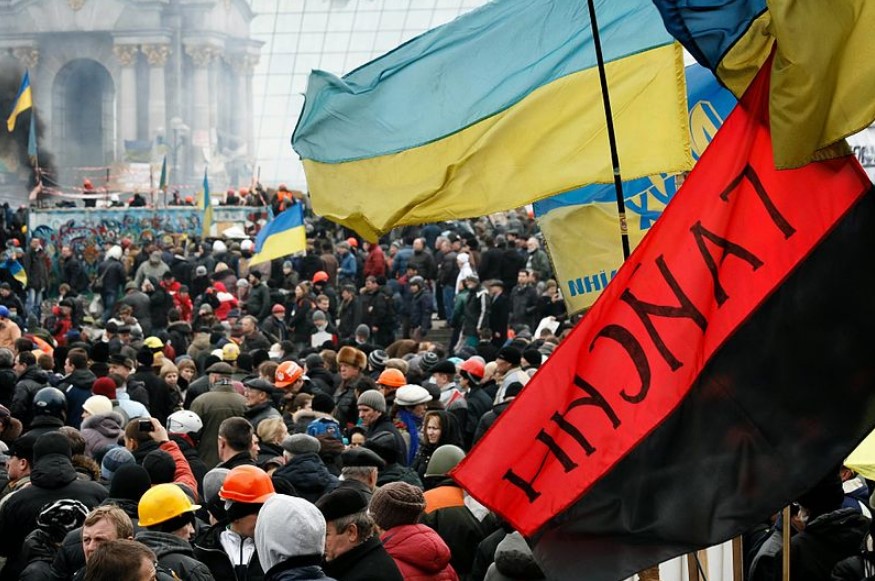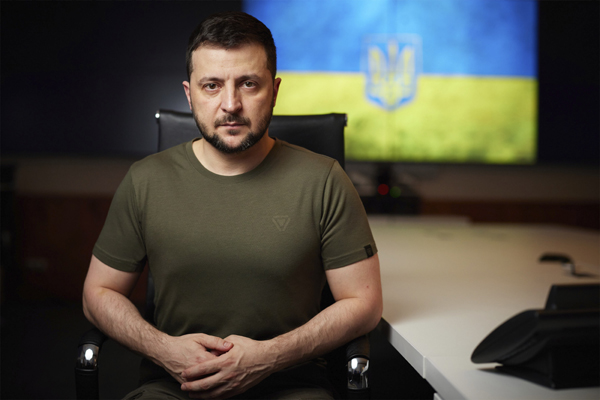At the start of July, the Ukrainian courts ordered the closure of the Communist Party of Ukraine (CPU) and the seizure of its assets. The anti-democratic attack is part of a scandalous campaign to crush political dissent and stain the image of ‘communism’ by associating it with Russian imperialism.
The Russian invasion in February gave a new pretext for the Zelensky regime – so-called defender of European democratic values – to repress political opposition, under the guise of fighting Russian collaborators.
The Ukrainian state already banned the activity of a number of political organisations and media outlets with this excuse. Of course, no evidence of collaboration was presented and some of these entities openly opposed the Russian invasion. As we have explained before, attacks on basic democratic rights in Ukraine started well before the invasion.
This shows the real character of the regime in Kiev: far from a beacon of democracy, it is a reactionary bourgeois nationalist government, manipulated as a proxy of US and NATO imperialism in a destructive war with Russian imperialism.
History of the CPU
The repression of communism in Ukraine began with the fall of the USSR. One of the first acts of the newly independent Ukrainian state in August of 1991 was to ban the Communist Party of Ukraine (CPU), following the accusation of organising a government overthrow.
 Ukraine followed Boris Yeltsin in banning its Communist Party / Image: www.kremlin.ru
Ukraine followed Boris Yeltsin in banning its Communist Party / Image: www.kremlin.ru
The Ukrainian parliament (Rada) was not following the “will of the people”, but the diktat of the gangsters now ruling Russia, where Boris Yeltsin had issued a decree an order to ban their own Communist Party the day before. The real attitude of the Ukrainian masses could be seen in the subsequent two years, which saw the formation of dozens of independent communist groups, functioning in a state of official illegality.
Some of these groups went on to reform the CPU in 1993 at a congress in Donetsk. The new party, particularly its youth wing, the Komsomol, showed a level of political activity not seen since the Stanist bureaucracy consolidated its power in the late 1920s.
The CPU politburo were trained in the Stalinist school, with all of the distortions that flow from this. Nevertheless, even compared to the tumultuous 1980s under the USSR, the first decade of Ukrainian independence was a humanitarian catastrophe.
This led to a renewed popularity for the USSR among the masses in Ukraine, especially those in the east and centre of the country, who were less influenced by Ukrainian nationalism, which was (and remains) openly anti-communist and pro-capitalist.
The parliamentary elections of 1998 saw the CPU take the largest share of the vote, with 25 percent. The “socialist parties” running against them took another 16.5 percent combined.
What followed was not a defeat of the oligarchy by the empowered communists, but united manoeuvring by the Ukrainian bourgeoisie to limit the threat of the CPU. At this time, the CPU was the only significant party in parliament standing against privatisations of state assets and gutting of state services, such as pensions.
A two-pronged strategy was employed to neutralise this threat. In addition to a red scare campaign organised by the bourgeois media, alliances were offered to the upper layers of the CPU, which were taken by party bureaucrats eager for privileges and a comfortable life.
This led, with the exception of the years immediately after the global economic crisis of 2009, to a continued drop in popularity for the CPU. By the time of the events of Euromaidan, where the Ukrainian oiligarchy with the help of far-right forces ousted the oligarch with whom the CPU were in coalition, they were in no position to offer an alternative to either pro or anti-Euromaidan movements.
In the separatist republics, where local party sections backed the new governments, they were briskly pushed aside by the more Russian-nationalist elements.
Post-Euromaidan decommunization and Russian invasion
The removal of the Lenin statue in Kyiv in the first days of Euromaidan and criminalisation of Soviet-era symbols in 2015 were a sign of things to come. What followed was a period of accelerated reaction on an unprecedented level where the CPU was attacked from all sides by far-right groups and the Ukrainian state.
 The removal of the Lenin statue in Kyiv in the first days of Euromaidan was a sign of things to come / Image: ВО Свобода
The removal of the Lenin statue in Kyiv in the first days of Euromaidan was a sign of things to come / Image: ВО Свобода
CPU party offices around the country were attacked and burned. Activists were assaulted in the streets and, suffice it to say, the Ukrainian judicial system offered no recourse for the victims of these assaults.
This was combined with a mass dismantling of USSR-era monuments and public artwork as part of the so-called decommunisation laws of 2015, which forced the CPU to officially dissolve their party and re-organise under the banner of the “Left Opposition”.
Despite the weak leadership of Petro Symonenko, and the advanced age of party activists, they were able to put up some resistance to the decommunisation laws in opposing the removal of statues. The 9 May marches in memory of the USSR victory over fascism in WW2 continued to take place in many parts of Ukraine despite pressure from the state and the far right.
Zelensky’s election over Poroshenko initially created some appearance of reduced state reaction, partly due to the general fatigue of the Ukrainian population with the far-right. Symonenko would even make some appearances on Ukrainian television channels again.
However, in the year preceding the Russian invasion, the Zelensky government, under pressure from far-right elements of the state forces and from his imperialist backers, has leaned more on Ukrainian nationalism, and repressing potential political opposition.
The Russian Army, for its part, cynically used Soviet-era symbols on occasion in an empty attempt to improve relations with sympathetic sections of the population by evoking the memory of WW2 liberation by the Red Army.
Far from bringing back the USSR, Russian imperialism has brought nothing to Ukraine other than the death and destruction of war.
Symonenko certainly did not help the situation of rank-and-file members by falling in line with the Communist Party of the Russian Federation’s (CPRF) scandalous support for Putin’s invasion, while appearing on a televised conference in May.
This betrayal follows a pattern of the CPU bureaucracy of having no understanding of genuine internationalism, nor faith in the working class, to the point of passively supporting the invasion of an arch-reactionary like Putin. CPU activity has been silent for some time anyway, but this could be due to internal opposition to the line of the leadership, as is more openly happening in the CPRF.
But in any case, we should be clear about the motives at play here. The Zelensky’s government’s biggest priority is to undermine any organised opposition to the war. It is happy to trample the democratic rights of freedom of expression and association in the process.
And moreover, by associating the CPU with the Russian invasion, the goal is to associate socialism and communism in general with Russia, and with the horrors of the current invasion: now and in the future.
It is no accident that the destruction of public USSR-era monuments, place names and artwork has also been ramped up. Just before the war, a person in the Kherson region received a five-year suspended sentence for publishing quotes by Lenin and Stalin online.
And in May, a woman in Odessa was arrested for selling Soviet-era badges. The images were apparently so ‘dangerous’ that the police blurred them out for their evidence report!
These scandalous attempts to repress socialism and communism must be opposed. We express solidarity with all left activists in Ukraine under repression and call for the building of revolutionary forces and class solidarity across all parts of the former USSR.
Down with state repression! Down with the inter-imperialist war! For the democratic rights to free speech and association! Build the forces of communist revolution across national lines!

